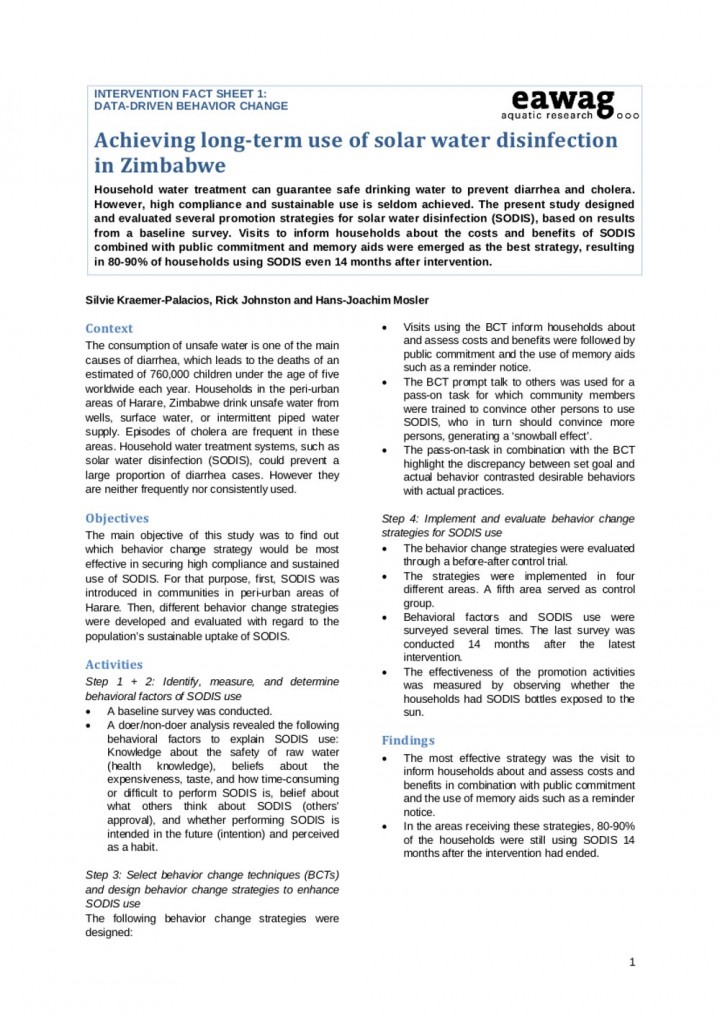RANAS (Risks, Attitudes, Norms, Abilities, and Self‐regulation) intervention fact sheets - 5 intervention fact sheets on data-driven behavior change
Mosler, H.-J. et al (2015)

Published in: 2015
Pages: 10
Publisher:
Swiss Federal Institute of Aquatic Science and Technology (Eawag), Dübendorf, Switzerland
Author:
Mosler, H.-J. et al
Uploaded by:
danijela milosevic
Partner profile:
common upload
5111 Views
131 Downloads
Location of library entry
These five fact sheets about interventions present case studies from Zimbabwe, Ethiopia, and Uganda and show the effects of different strategies that were applied in order to achieve behavior changes.
Intervention fact sheet 1:
Achieving long-term use of solar water disinfection in Zimbabwe
Household water treatment can guarantee safe drinking water to prevent diarrhea and cholera. However, high compliance and sustainable use is seldom achieved. The present study designed and evaluated several promotion strategies for solar water disinfection (SODIS), based on results from a baseline survey. Visits to inform households about the costs and benefits of SODIS combined with public commitment and memory aids emerged as the best strategy, resulting in 80-90% of households using SODIS even 14 months after intervention.
Intervention fact sheet 2: Using persuasive arguments to change perceived costs and thus consumption of safe water in Ethiopia
Fluorosis is caused by undue fluoride uptake from drinking water. In the Ethiopian Great Rift Valley, the consumption of fluoride-free water from a community filter was promoted by a) a traditional information intervention targeting perceived vulnerability, and b) a systematic behavior change strategy targeting perceived costs. While the intervention targeting perceived vulnerability showed no effects, cost persuasion decreased the perceived costs to a 50% lower value and increased the consumption of fluoride-free water by 20%. This showed that altering subjective perceptions of facts like prices or walking distances can change behavior even without changing
objective circumstances.
Intervention fact sheet 3:
Increasing fluoride filter use in rural Ethiopia
High levels of fluoride concentrations in water can lead to fluorosis, which eventually cripples sufferers. Fluoride removal household filters are efficient in preventing it, but their effectiveness depends on adequate use. In a longitudinal study, based on the RANAS approach, behavioral factors of filter use were assessed and two behavior change strategies were developed aimed specifically at the critical behavioral factors. Both strategies, a planning and social-prompt intervention and an education workshop combined with pledging, were able to raise use to a level sufficient to prevent fluorosis. Mere provision of the fluoride removal filter led to insufficient use, but combining this with a behavior change technique led to more than 80% use of filtered water for drinking and cooking.
Intervention fact sheet 4:
Changing handwashing behavior in southern Ethiopia through infrastructural and commitment interventions
Regular handwashing is the single most effective prevention against diarrheal disease. However, handwashing rates are low in many developing countries, including Ethiopia. A handwashing promotion project in the Borena Zone of southern Ethiopia aimed to increase handwashing rates in communities through systematic behavior change strategies. The strategies applied, especially the tippy tap promotion, proved to be more effective than a standard educational approach: 95% of intervention households were successfully motivated to construct a tippy tap. Three months after the intervention had ended, water and soap were present at the tippy tap in 50-80% of the households.
Intervention fact sheet 5:
Increasing shared toilet users’ cleaning behavior: the case of urban slums in Kampala, Uganda
Access to shared toilets is the most common on-site mode of sanitation in urban informal settlements. However, their maintenance depends on users’ appropriate usage and cleaning behavior. A user-driven sanitation (UDS) project in Kampala’s urban slums aimed to increase shared toilet users’ cleaning behavior. Group discussions between users of a shared toilet were applied in combination with public commitment as a behavior change strategy. The strategy increased cleaning behavior by up to 30%.
Bibliographic information
Mosler, H.-J. et al (2015). RANAS (Risks, Attitudes, Norms, Abilities, and Self‐regulation) intervention fact sheets - 5 intervention fact sheets on data-driven behavior change. Swiss Federal Institute of Aquatic Science and Technology (Eawag), Dübendorf, Switzerland
Filter tags
Behaviour change (WG13) English Factsheets and policy briefs Practitioners Recommended by SuSanA (other than SuSanA publications) Sub-Saharan Africa














